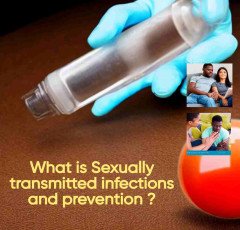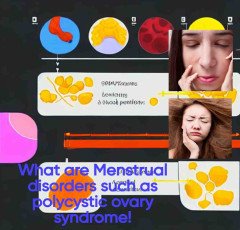
What is Sexually transmitted infections and prevention ?

Sexual contact with an infected person can result in the transmission of sexually transmitted diseases (STIs).
Chlamydia, gonorrhea, syphilis, human papillomavirus (HPV), genital herpes, and HIV/AIDS are a few examples of frequent STIs.
STI prevention calls for safe sex practices.
This can involve receiving routine STI screenings as well as wearing condoms or dental dams during oral, anal, and vaginal sex. Also crucial is being honest with your sexual partners about your past relationships and any worries you may have.
Getting vaccinated against some STIs, like HPV, can also help prevent infection and promote safe sexual practices.
For those between the ages of 9 and 26 who are both male and female, HPV vaccination is advised.
It's vital to keep in mind that many STIs may not immediately exhibit symptoms, making routine testing the best approach to determine whether you have an infection and stop the transmission of it to others.
To minimize complications and stop the infection from spreading to others, it's critical to get tested and treated as soon as you suspect you may have been exposed to a STI.
It's crucial to follow your healthcare provider's treatment recommendations if you test positive for a STI.
These recommendations may include taking medication or undergoing other treatments to manage the infection.
Notifying your sexual partners is also necessary so that they can receive testing and treatment.
There are other actions you may take to lower your risk of acquiring a STI in addition to safe sex practices and routine testing. These consist of: -
In general, safe sexual behaviors, routine testing, and open communication with sexual partners all contribute to STI prevention. You may contribute to preventing the spread of these infections by taking simple precautions to protect yourself and others.
It's crucial to remember that some demographic groups may be more susceptible to STIs than others, including:
It is especially crucial to adopt STI prevention measures if you fall into one of these higher-risk categories, such as continuously using condoms or dental dams and getting tested.
STIs can have social, emotional, and physical health repercussions in addition to physical ones.
A positive STI diagnosis can have a substantial emotional impact because some STIs can result in stigma or shame.
It's critical to get help if you are struggling with the emotional effects of receiving a STI diagnosis or if you have general worries around sexual health.
A comprehensive strategy that include education, open communication with sexual partners, and a dedication to safe sex practices is necessary to prevent STIs. You may help prevent the spread of these infections, improve general sexual health and wellbeing, and protect yourself and others by following these actions.
It's also critical to remember that, if left untreated, STIs can have major long-term health effects.
For instance, some STIs might result in malignancy, severe discomfort, or even infertility. STIs can also be transmitted to an unborn child by pregnant women, which can have major health repercussions.
As a result, it's critical to get tested and treated as soon as you suspect you may have been exposed to a STI.
Early diagnosis and treatment can lessen the chance of complications and the infection infecting others.
Prioritizing your entire sexual health is equally vital to safe sex practices and routine testing.
Speaking candidly and openly with your sexual partners about your sexual history, desires, and worries is one way to achieve this. In order to address any emotional or psychological concerns connected to sexual health, it may also entail looking for options, such as counseling or support groups.
An essential component of overall sexual health and wellbeing is STI prevention.
You may prevent the spread of these viruses and encourage a healthy and enjoyable sex life by engaging in safe sex, getting tested frequently, and seeking out help when necessary.
It's also important to note that some STI beliefs can cause stigma and shame.
It's critical to keep in mind that anyone can have a STI, and having one does not imply promiscuity or immoral behavior.
STIs are essentially sexually transmitted infections that can be contracted by anyone.
It's crucial to look for reliable advice and assistance if you've been diagnosed with a STI.
This could entail speaking with your doctor, using internet tools, or joining a support group.
It's crucial to warn your sexual partners and take precautions to stop the infection from spreading.
Safe sex behaviors, communication, and education must all be used to prevent STIs.
You may contribute to the promotion of sexual health and well-being for yourself and your community by remaining aware, being open with sexual partners, and taking precautions to protect yourself and others.
It is more crucial to understand that maintaining general sexual health is more than only preventing STIs.
Additional vital elements of sexual health include: -
Prioritizing all facets of sexual health will enable you to safeguard your overall health and wellbeing while ensuring that you and your partners have satisfying and joyful sexual interactions.
Must understand that maintaining good sexual health involves more than just preventing complications like STIs or unwanted pregnancy.
It also aims to encourage joyful, respectful, and consenting sexual encounters. This entails being aware of your own sexual wants and boundaries as well as your partner(s)' needs and desires.
It's never too late to start improving your sexual health and well-being because sexual health is a lifelong process.
There are always new things to learn and strategies to enhance your sexual health, regardless of how long you have been sexually active or how recently you have begun to explore your sexuality.
Although STI prevention is a crucial component of sexual health, it is only one facet of a bigger picture.
You may aid in preventing the spread of STIs while also advancing general sexual health and well-being by prioritizing safe
sex practices, routine testing, and open communication with sexual partners.
Must understand that there is no one "right" way to lead a joyful and healthy sex life, and that sexual health can differ greatly from person to person. It's crucial to respect and appreciate diversity in sexual orientation, gender identity, and sexual behaviors because sexual health is a personal and individual experience.
The first step for people who might be dealing with sexual health issues or suffering sexual dysfunction is to get professional assistance from a doctor or therapist. Medical therapies can often treat or manage many sexual health issues, while therapy or counseling can assist in addressing emotional or psychological impediments to sexual health and well-being.
In addition to being a personal concern, sexual health is also a matter of public health.
We can contribute to the development of a more just and equitable society for all by promoting sexual health education and resources, fighting for access to cheap and comprehensive sexual health treatments, and working to lessen stigma and discrimination associated with sexual health.
It's true that sexual health is essential to general health and wellbeing, and that it's crucial to approach it from a
comprehensive and all-encompassing standpoint. This entails appreciating the many needs and experiences that people have as individuals and as communities, as well as trying to promote sexual health in ways that are sensitive to and responsive to cultural differences.
It's crucial to understand how sexual health is related to other facets of health and wellbeing, including social, mental, and physical wellbeing. By addressing these interrelated issues, one can enhance one's entire quality of life while promoting sexual health and well-being.
In order to maintain total health and well-being, sexual health necessitates constant education, communication, and care.
You may support the promotion of a healthy and full sexual life for yourself and your community by emphasizing safe sex practices, looking for knowledge and resources, and addressing any concerns or challenges connected to sexual health.
Absolutely, and it's important to emphasize that maintaining good sexual health is a lifelong process that calls for attention and care. This entails keeping up with current advancements in science and technology related to sexual health and being willing to modify your routines and habits as necessary.
Should keep in mind that having a healthy sexuality is nothing to be embarrassed or humiliated about.
Everyone should feel empowered to make decisions about their own sexual experiences and relationships and have access to reliable tools, support, and knowledge regarding sexual health. We can contribute to the development of a society where everyone can have satisfying, healthy, and consensual sexual encounters by fostering a culture of transparency, respect, and inclusivity around sexual health.
It's important to remember that sexual health is a matter of public health as well as personal concern.
The public health is significantly impacted by STIs and unwanted pregnancies, which can also result in long-term health
issues, a lower quality of life, and higher healthcare expenses. We may contribute to the improvement of a community's general health and well-being by supporting sexual health education, access to inexpensive and thorough sexual health treatments, and lowering stigma and discrimination associated with sexual health.
Recognizing that sexual health is a human right and that everyone deserves access to the information and assistance they need to make decisions about their sexual health and wellbeing is also crucial.
Access to comprehensive sexual health information, contraception, STI testing and treatment, and other sexual health services are all included in this.
A vital component of total health and wellbeing is sexual health, which necessitates constant attention and
care from people, healthcare professionals, and society at large. We may contribute to the development of a society where everyone has access to meaningful and healthy sexual experiences by putting a priority on safe sex practices, seeking out knowledge and resources, and fostering a culture of openness and inclusivity surrounding sexual health.
Should understand that sexual health is a problem affecting people of all ages, genders, and sexual orientations.
Providing older persons with support in resolving sexual dysfunction or managing changes in their sexual health as they age is crucial because it helps them establish healthy attitudes and actions surrounding sex. Comprehensive sexuality education is also vital for young people.
Should accept that some groups may be more prone to sexual health issues or may experience more difficulties getting access to services and support for the issue. persons of color, LGBTQ+ persons, the poor, and those with disabilities may all be included in these populations. For a society to be more just and inclusive, it is crucial to address these inequities and encourage equitable access to sexual health resources and assistance.
Should understand that sexual health is a complicated topic that incorporates not just physical health, but also emotional, social, and cultural issues.
We can guarantee that people and communities have the resources and support they need to have meaningful and healthy sexual experiences throughout their lives by advocating for a comprehensive and inclusive approach to sexual health.
Recognize that improving sexual health necessitates a holistic strategy that includes information, healthcare access, and a decrease in stigma and prejudice connected to sex and sexuality.
Promoting sexual health requires comprehensive education about sexuality.
This instruction ought to cover topics like consent, communication, and healthy relationships as well as safe sexual behavior.
It's crucial to deliver this instruction in a way that respects multiple identities and experiences, is age-appropriate, and is culturally sensitive.
Promoting sexual health also depends on having access to healthcare.
This covers having access to STI testing and treatment, contraception, and other sexual health services.
It's crucial to make sure that these programs are accessible, inexpensive, and attentive to the cultural needs of various groups.
Promoting sexual health also requires lowering stigma and discrimination associated with sex and sexuality.
This entails tackling social taboos surrounding sex as well as dispelling unfavorable assumptions and biases regarding sexual orientation, gender identity, and other facets of sexual diversity. All of us can benefit from more open, welcoming, and inclusive attitudes toward sex and sexuality, which will serve to advance the general cause of sexual health and well-being.
In conclusion, enhancing sexual health necessitates an all-encompassing strategy that takes into account the various aspects of sexual health and wellbeing.
We can contribute to the development of a society where everyone has the chance to engage in meaningful and healthy sexual experiences by placing a high priority on education, healthcare access, and the elimination of stigma and discrimination connected to sex and sexuality.















 Only For The United States
Only For The United States  NordPass
NordPass  Acer Laptop
Acer Laptop  One World Collection
One World Collection  TitTok Revolution
TitTok Revolution  Sennheiser
Sennheiser  Men Clothing
Men Clothing  SEO Checklist
SEO Checklist  Unreal Engine 5 For Beginners Learn The Basics Of Virtual Production
Unreal Engine 5 For Beginners Learn The Basics Of Virtual Production  Artificial Intelligence
Artificial Intelligence  Hot Bags For Pain Relief
Hot Bags For Pain Relief  Amazon Best Selling Products
Amazon Best Selling Products  Best Home Appliances
Best Home Appliances  Best Robotic Vacuum Cleaners
Best Robotic Vacuum Cleaners  Graphics & Design
Graphics & Design  Favorite Company (Cuelinks)
Favorite Company (Cuelinks)  Smart Doorbell
Smart Doorbell  Online Marketing
Online Marketing  NordLocker
NordLocker  The Secret Email System
The Secret Email System  NordVPN
NordVPN  Online Technology Classes
Online Technology Classes  SOFAS
SOFAS  RPM 3.0
RPM 3.0  The Click Engine
The Click Engine  Best Sellers On Amazon
Best Sellers On Amazon  ASPINAL LONDON
ASPINAL LONDON  All Wireless Products
All Wireless Products  Top Rated From Amazon
Top Rated From Amazon  Women Fashion
Women Fashion  1150+Trendy kids coloring pages Bundle
1150+Trendy kids coloring pages Bundle  Hello Theme
Hello Theme  Creative Brief For Video Shoot
Creative Brief For Video Shoot  ASUS Laptop
ASUS Laptop  Unlimited access to classes on illustration, photography, design, film, music
Unlimited access to classes on illustration, photography, design, film, music  BEST SELLER TOP10
BEST SELLER TOP10  Best Selling Books
Best Selling Books  ELECTRONIC ACCESSORIES
ELECTRONIC ACCESSORIES 
















